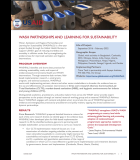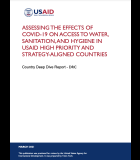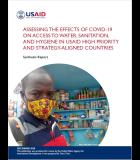Maternal and Child Survival Program – DRC (MCSP-DRC)
USAID's Bureau for Global Health’s flagship Maternal and Child Survival Program (MCSP) is designed to advance USAID’s goal of Ending Preventable Child and Maternal Deaths, and is currently working in 25 countries.
MCSP supports the introduction and scale-up of high-impact, sustainable reproductive, maternal, newborn and child health (RMNCH) interventions in partnership with ministries of health and other partners. MCSP accepts all sources of health funds and can be accessed via field support. While MCSP is the principal follow-on to the Maternal and Child Health Integrated Program (MCHIP), the scope has expanded to reflect a changing global RMNCH landscape as well as shifts in USAID’s own priorities. MCSP places a greater emphasis on key cross-cutting issues such as innovation, e/mHealth, equity, quality, gender, public-private partnerships and involvement of civil society, community approaches, health systems strengthening, and behavior change interventions. While maintaining a focus on technical, high-impact interventions, MCSP works toward sustainable scale-up to include the health systems that deliver these interventions.
Activity Description
MCSP is helping to reduce maternal and child mortality in DR Congo by strengthening Ministry of Health capacity to strategically scale up cost-effective, evidence-based interventions.
The Program works to increase the capacity of Congolese health professional organizations to provide high-quality, in-service training and pre-service education on key maternal and newborn health and postpartum family planning interventions. In under-served, rural communities, we're also providing technical support for integrated community case management, integrated management of childhood illness, and community- and facility-based family planning interventions.
Expected Outcomes
The expected outcomes of the program were to:
- Support countries to increase coverage and utilization of evidence-based, high-quality reproductive, maternal, newborn and child health (RMNCH) interventions at the household, community and health facility levels
- Close innovation gaps to improve health outcomes among high-burden and vulnerable populations through engagement with a broad range of partners
- Foster effective policymaking, program learning and accountability for improved RMNCH outcomes across the continuum of care
Actual Outcomes
The actual outcomes of the program were:
- Strengthened the MOH’s Directorate of Family and Specific Groups’ Health
- Improved MOH, donor and stakeholder coordination
- Updated national child health policies and programming
- Strengthened national family planning policies and programming
- Identified organizational strengthening needs and initiated action planning
- Promoted evidence-based human capacity development
- Increased access to integrated child health services in facilities and communities
- Programed learning on the integration of nutrition and iCCM
- Strengthened provider and facility capacity for family planning
- Introduced the Clean Clinic Approach






